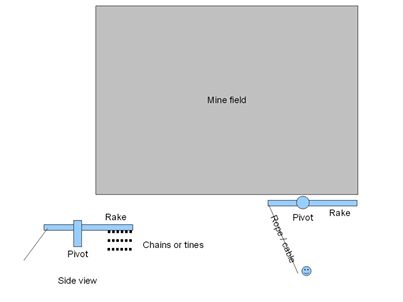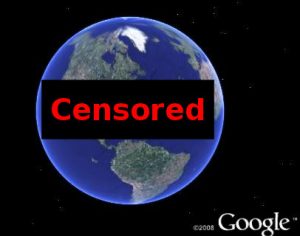Zero Mines, cheap-low-tech land mine clearing tool
Zero Mines is a group of people worldwide working on Open Source solutions for clearing land mines so people can grow food, travel, and live safely. Here is my suggestion.

Over 100 million land mines have been deployed around the world. Most of the places where these land mine are located are impoverished. The area that needs to be cleared is vast. The ideal solution would use cheap, easily available materials, that can be put together by anyone so that local people can quickly clear their own land.
The standard military approach to clearing a mine field is to use a heavily armored vehicle with a motorized flail to trigger the landmines. Armor is one way of staying safe while detonating a mine but not the only way. Distance is another.
A strong rope is cheap and can pull a heavy object across a mine field from a distance to detonate any mines. But you typically must go forward into a mine field. So how can you pull something towards you without first putting it in front of you? There is a very simple way.
The device I described fits those requirements. It is just a big rake rotating on a pivot pulled by a rope or cable from a safe distance to trigger mines.
1. place the pivot
2. pull the rope or cable from a safe distance or behind sand bags
3. sweep the rake over area to be cleared
4. move pivot / rake to cover more area
5. repeat
Dragging an object a distance from the arm would reduce the damage to the arm but even if the arm is damaged it is cheap and easy to replace. This might not be enough for all uses of the land or all types of land but can quickly clear an area for human travel and light use. If you need to go deeper use a heavier object and tines to dig up the ground.
Technology Trumps Nations

Google Censors Earth
The British military believes people in Iraq are using Google Earth to plan attacks on British bases. This article was brought up on a mailing list I participate in. The part they found interesting was,
Soldiers from the Royal Green Jackets based at the Basra Palace base said they had considered suing Google Earth if they were injured by mortar rounds that had been directed on the camp by the aerial footage.
The question was asked on the mailing list, “Should Google block out areas of it maps? Should they do this voluntarily? Should governments require them to do it?”
Before I go into this further I’ll point out another recent article also involving Google and a nation flexing its power.
The only reason I saw the video was because of the ban. And I didn’t see it on YouTube. And YouTube was not the original place it was posted. The only reason I saw that video was because Brazil tried to prevent people from seeing it.
Now consider the British military asked Google to remove information from Google Earth and they did. Again, the only reason I looked at it was because they tried to stop me, and I didn’t see it using Google Earth. There is a trend here. But the bigger issue is how technology has pointed out the irrelevance of nations.
In both cases a nation attempted to flex its muscle and found individuals just went around it. The attempt to force people to comply actually caused the opposite effect from that desired. And in both cases Google tried to comply.
Google is an international company; it has offices in many nations and serves users all over the world. If Google agreed to the request of the British military to remove some information shouldn’t Google also provide similar help to Iraqi’s? How does Google choose sides? And how does it even determine what the sides are?
The Sunnis are fighting the Shiites but they are both fighting the UN. What is an Iraqi? Is it the people that claim to be the elected government? Is it the people that live in the region now? That would include at least 5 different groups that don’t get along with each other. Is it the people that were born there and live elsewhere? The area we now know as Iraq had been called Babylon for most of history. Is there really even such a thing as an Iraqi?
The concept of geographic identity doesn’t make sense. I suggest that it never really made sense but was convenient because of limitations of technology of the time. Now that technology has advanced, it reveals the mistaken assumptions of identity being tied to location.
Nations were useful in the past because people were unable to easily travel very far. But people have always traveled around the world. And we now know it’s possible to travel to other planets and even stars. It might not be practical yet but that is only a matter of technology.
What is finally becoming obvious is people are individuals. The most meaningful identities are those the individual chooses. It’s not demographics, its not geographics, its psychographics!
If you want to see the next big area of innovation look at how people identify themselves. Choices such as religion, language, hobbies, attractions, and interests are the new sources of identity. The Internet has allowed people to find their “tribe” no matter where on the planet they happen to be. And it has allowed people to belong to many differ t tribes. The relationships between people are the key elements of identity. What can you do to help people create and affirm their relationships?
Some ideas to consider:
- Communication technology: anything that empowers the individual
- Fashion: things that help individuals declare their uniqueness and quickly see people with similar interests and values.
- Games: ways of sharing experiencing enjoyment with others.
- Easier, cheaper travel: the easier it is for individuals to freely travel the more success the service. This is the exact opposite of how governments are acting. That is probably because of the inherent geographic identity of nations.
- Language services and tools: translate, teach, search for content
- Shipping of regional specialties: this is part of the idea of mass customization. Make the rare as accessible as the common.
- Events and activities to bring people with common interests together.
- More flexible living arrangements. Comfortable places to stay. Places to keep your possessions.
- Ways for people to share living space. Ways for people to live apart from others.
There are millions of possibilities in just the items I listed. There are many other ways as well. The important thing for you to do is look past the assumptions from the past and focus on satisfying the primary need of gaining and deciding how to direct attention.



 Predictive Innovation Training
Predictive Innovation Training Predictive Innovation: Core Skills Book
Predictive Innovation: Core Skills Book RoundSquareTriangle.com
RoundSquareTriangle.com